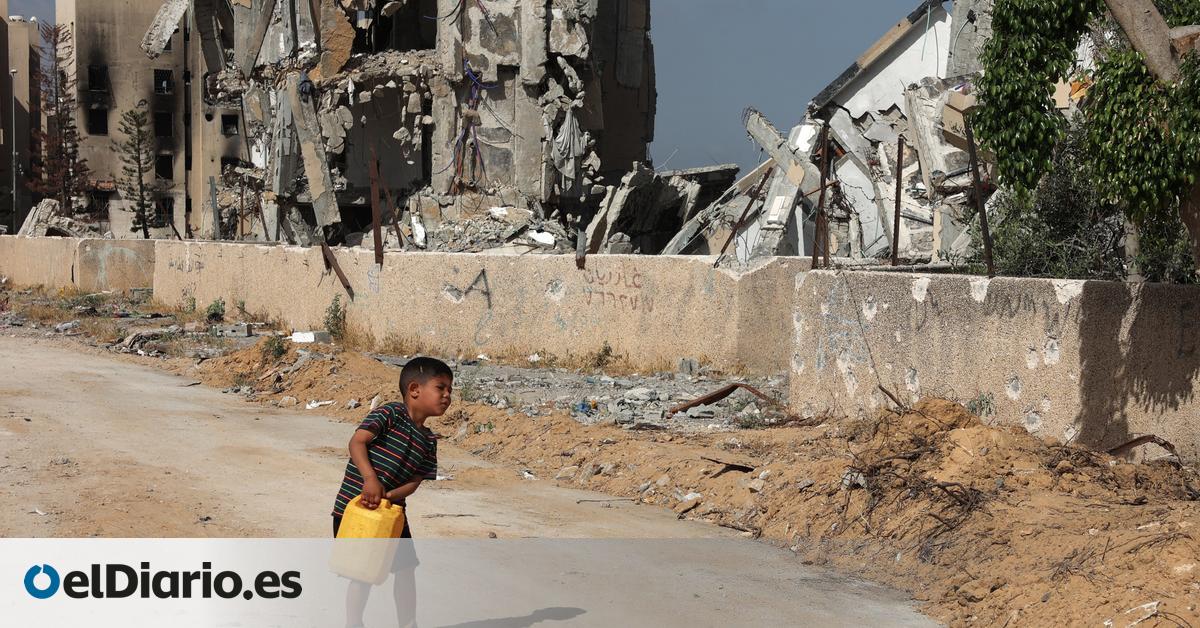
Hopes for a ceasefire in Gaza have risen this Saturday with the arrival in Cairo of a Hamas delegation to continue indirect talks, in what is believed to be a response to a new proposal, apparently accepted by Israel, to stop fighting for an initial period of 40 days and exchange hostages for Palestinian prisoners.
Egyptian and American mediators have shown signs of progress in recent days, with the Egyptian state news channel Al-Qahera saying on Saturday that a consensus had been reached in indirect talks on many of the points in dispute, but did not elaborate further. details.
However, many analysts remain pessimistic after five months of interrupted talks that have frequently broken down. Negotiators have constantly struggled to reconcile Hamas’s demand for a lasting ceasefire that would allow the organization to claim victory with the apparent determination of Benjamin Netanyahu, Israeli Prime Minister, to force Hamas from power, kill or capture its leaders and destroy all its military capabilities.
A senior Israeli official, who spoke Saturday on condition of anonymity about the ongoing negotiations, downplayed the prospects for a complete end to the war in Gaza. The official said Israel was committed to an offensive on Rafah, Gaza’s southernmost city, and would not under any circumstances agree to end the war as part of a hostage release deal.
Egyptian sources declared Wall Street Journal that Israel would give the truce talks one more week, after which it would launch its offensive, which it has been threatening for some time.
The United States has tried to pressure Hamas to accept the latest proposals, widely seen as a last chance to avoid intense new fighting. Any Israeli offensive on Rafah is likely to result in many new civilian casualties and exacerbate Gaza’s severe humanitarian crisis.
“The only thing standing between the people of Gaza and a ceasefire is Hamas,” US Secretary of State Antony Blinken declared on Friday.
Blinken also reiterated Washington’s objections to an offensive in Rafah, stating that Israel had not presented a credible plan to protect the 1.2 million or more displaced civilians from other parts of Gaza who have sought refuge in sprawling refugee camps with tents and in UN shelters there.
“In the absence of such a plan, we cannot support a major military operation in Rafah, because the damage it would cause would be unacceptable,” he said.
Humanitarian groups and the United Nations have also repeatedly called on Israel to call off the attack on Rafah.
Tedros Adhanom Ghebreyesus, director-general of the WHO, warned on Friday that a large-scale military operation in Rafah “could lead to a bloodbath and further weaken an already broken health system.”
Israeli authorities say a ground offensive in Rafah is essential to achieving Israel’s stated objectives, as they say thousands of Hamas fighters and their leaders are based there.
Hamas took about 250 hostages during the October 7 attack on southern Israel, which triggered the Israeli massacre in Gaza. About half of the hostages are still held in Gaza, and Tel Aviv says many of them are in or near Rafah.
Some 1,200 Israelis were killed in the October Hamas attack, most of them civilians. And more than 34,600 have died in Gaza, mostly women and children, in the Israeli military offensive in retaliation.
Israeli strikes early Saturday in Gaza killed at least six people. Three bodies were recovered from the rubble of a building in Rafah and taken to Yousef al-Najjar Hospital. An attack on the Nuseirat refugee camp in central Gaza also killed three people, according to hospital workers.
In the last 24 hours, the bodies of 32 people killed by Israeli attacks have been transferred to local hospitals, the Gaza Ministry of Health reported on Saturday. The ministry does not distinguish between combatants and civilians in its counts.
Hamas, ruling the Gaza Strip since 2007, says it is studying the latest truce proposal in a “positive spirit.”
But the group appears to be divided, and statements from its political wing, now headquartered in Istanbul, often do not reflect the views of Yahya Sinwar, the organizer of the October attacks and top Hamas leader in Gaza.
Observers say it is significant that the Hamas delegation now in Cairo is headed by Khalil al-Hayya, deputy head of the group’s political arm in Gaza, rather than a more senior figure who may lack credibility with Sinwar, who has ultimate authority over any agreement.
The Israeli government is also deeply divided. Senior officials in his war cabinet are willing to guarantee a ceasefire and release surviving prisoners, but far-right ministers have threatened to bring down Netanyahu’s ruling coalition if the war is not pursued with greater vigor.
The United States, along with Egypt and Qatar, has been trying to seal a ceasefire agreement in the nearly seven-month war.
During the last truce, more than a week in November, 80 Israeli hostages were exchanged for 240 Palestinian prisoners. Up to a third of those held captive by Hamas are believed to have died.
The Israeli siege has brought many of Gaza’s 2.4 million residents to the brink of famine.
Pressure from the United States has led Israel to facilitate more aid shipments to Gaza, including through the reopened Erez border crossing, which leads directly to the north, the hardest hit area.
Last week, Israeli settlers blocked a convoy using a new route from Jordan before crossing into Gaza. Once inside the territory, the convoy was commandeered by Hamas militants, before UN officials recovered it.
Food availability has improved “somewhat,” according to the UN and Rafah residents interviewed byThe Guardian, and prices of some basic commodities have fallen to near pre-war levels in southern areas, where there is more aid.
The US-based charity World Central Kitchen resumed operations this week, after suspending them in the wake of Israeli drone strikes that killed seven of its employees while unloading aid in Gaza on April 1.
World Central Kitchen was involved earlier this year in an effort to establish a new maritime aid corridor to Gaza from Cyprus to offset declining land deliveries from Israel.
The project suffered a new setback on Friday, when the US military announced that strong winds had forced troops working on setting up a temporary aid dock off the coast of Gaza to move to the Israeli port of Ashdod.
However, the head of the UN food program warned of “total famine” in northern Gaza despite slight improvements, and reiterated his call for a ceasefire in Israel’s war against Hamas.
“There is famine, full-blown famine, in the north, and it is moving south,” said Cindy McCain, executive director of the World Food Programme.
Source: www.eldiario.es

